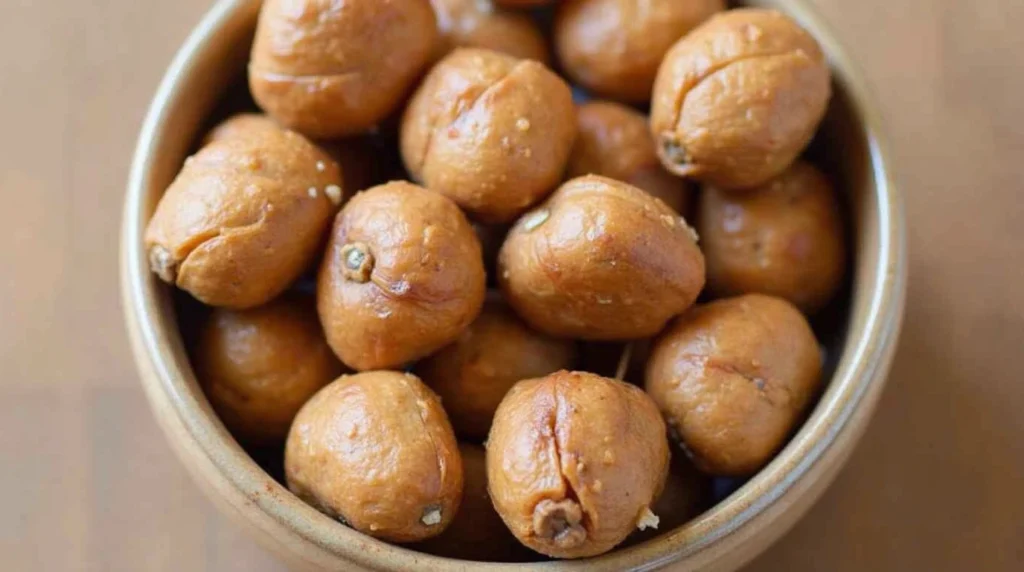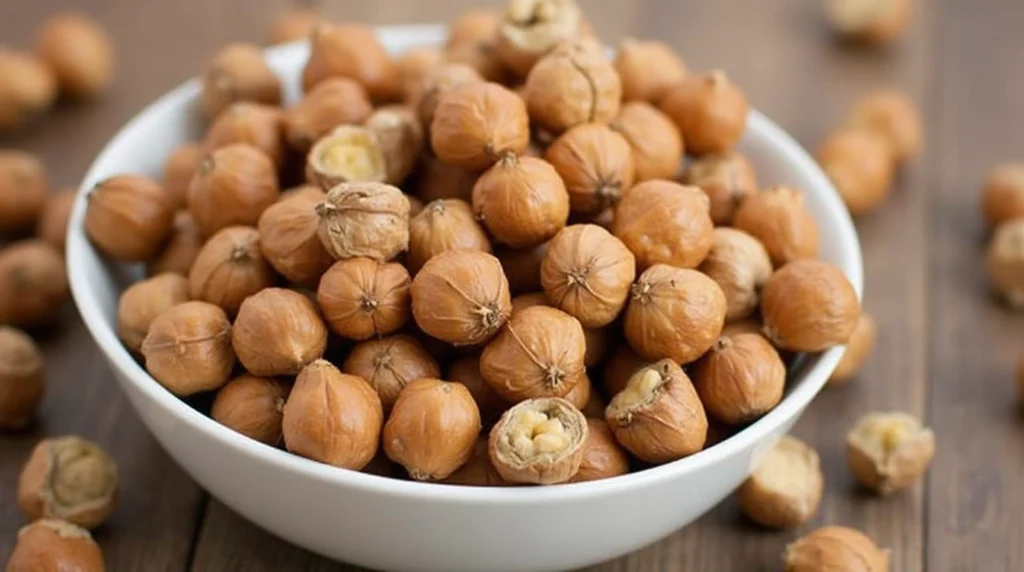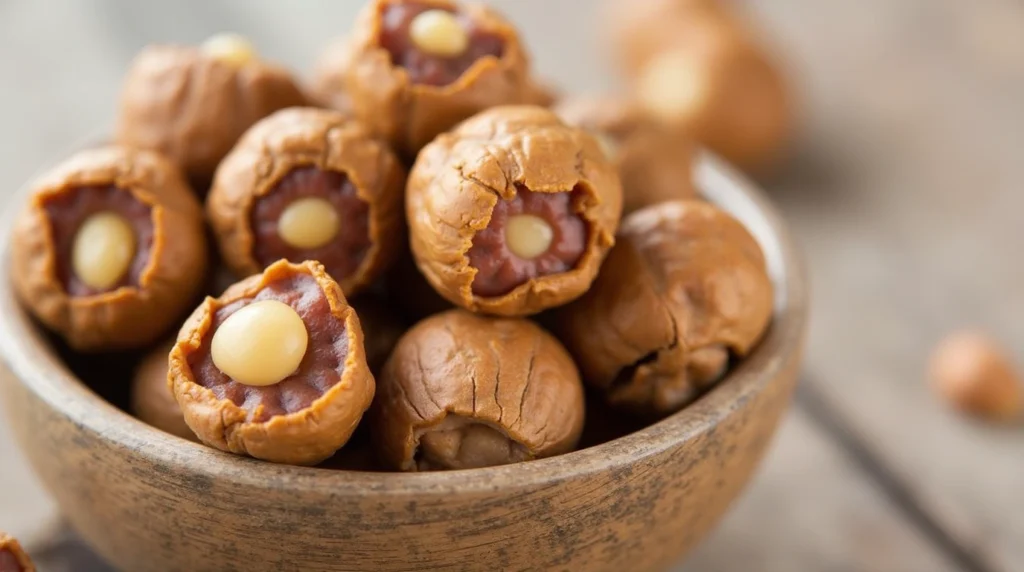Introduction

What is the best way to eat hazelnuts? Have you ever wondered how to enjoy the rich, nutty goodness of hazelnuts in ways that go beyond just snacking? Hazelnuts are more than just a tasty treat—they’re packed with nutrients and offer endless possibilities for creativity in the kitchen. Whether you’re looking to incorporate them into your daily meals or want to explore their potential in desserts, this article will guide you through ten delicious ideas to elevate your culinary experience.
Let me share a personal story. The first time I tried hazelnuts was during a chilly autumn afternoon when my grandmother served me a warm slice of hazelnut cake. That moment changed everything—I realized there’s so much more to these nuts than meets the eye. This article aims to inspire you with practical tips and creative recipes, ensuring you never run out of ideas on how to savor hazelnuts.
Purpose: By the end of this guide, you’ll discover what is truly the best way to eat hazelnuts, tailored to your preferences and lifestyle.
Understanding Hazelnuts – The Basics
Before we dive into the delicious world of hazelnut recipes, let’s take a closer look at what makes these nuts so special.
What Are Hazelnuts?
Hazelnuts, also known as filberts, come from the Corylus tree species, primarily grown in regions like Turkey and Oregon. These small, round nuts have been prized for centuries not only for their flavor but also for their versatility in cooking and baking.
- Origin: Native to temperate regions of Europe and Asia.
- Major Producers: Turkey leads global production, followed by Italy and the U.S. (Oregon).
Health Benefits of Eating Hazelnuts
Did you know hazelnuts are nutritional powerhouses? They’re loaded with essential vitamins and minerals that support overall well-being.
- Key Nutrients: Rich in magnesium, vitamin E, manganese, and healthy fats.
- Health Perks: Promotes heart health, boosts brain function, and supports glowing skin.
- Source: According to the USDA, a single serving of hazelnuts provides nearly 20% of your daily recommended intake of magnesium.
Raw vs Roasted Hazelnuts – Which Is Better?
Both raw and roasted hazelnuts bring unique benefits to the table. Here’s how they compare:
| Aspect | Raw Hazelnuts | Roasted Hazelnuts |
|---|---|---|
| Flavor | Mild, earthy | Deep, nutty |
| Nutritional Value | Retain all natural oils and enzymes | Slight loss of heat-sensitive nutrients |
| Best Uses | Smoothies, salads, baking | Snacks, pesto, coatings |
Choose based on your preference—raw for maximum nutrition or roasted for enhanced taste.
Tasty Snack Ideas with Hazelnuts
Snacking doesn’t have to be boring! Incorporate hazelnuts into your routine for a satisfying crunch.
Chocolate-Covered Hazelnuts
Who can resist the indulgent combination of chocolate and hazelnuts?
- Why It Works: Chocolate enhances the nuttiness of hazelnuts while adding sweetness.
- DIY Option: Melt dark chocolate, dip whole hazelnuts, and refrigerate until set.
- Store-Bought Tip: Look for premium brands with minimal added sugar.
Trail Mix with Hazelnuts
Create a portable snack mix that satisfies hunger pangs anytime, anywhere.
- Ingredients: Combine hazelnuts with dried fruits, seeds, and other nuts.
- Pro Tip: Use unsalted hazelnuts to control sodium levels.
Nutella-Inspired Spread
While store-bought Nutella is irresistible, making your own version allows you to customize ingredients.
- Recipe Idea: Blend roasted hazelnuts, cocoa powder, honey, and a splash of milk.
- Healthier Twist: Reduce sugar content and use almond milk for creaminess.

Incorporating Hazelnuts into Breakfast
Start your day right with hazelnut-infused breakfast options that fuel both body and mind.
Hazelnut Butter on Toast
Swap peanut butter for something new and exciting.
- Pairings: Whole-grain bread topped with sliced bananas, berries, or drizzled honey.
- Tip: Opt for homemade hazelnut butter to avoid preservatives.
Sprinkling Chopped Hazelnuts on Yogurt
Transform plain yogurt into a gourmet delight with a sprinkle of chopped hazelnuts.
- Additions: Mix with granola, fresh fruit, and chia seeds for extra texture.
- Health Boost: Hazelnuts provide protein and fiber to keep you full longer.
Adding Hazelnuts to Smoothies
Blend ground hazelnuts into smoothies for an energy-packed drink.
- Table Recipe Example:
- Base Ingredients: Banana, spinach, frozen berries.
- Hazelnut Add-Ons: Ground hazelnuts + hazelnut milk.
- Result: A creamy, nutritious blend perfect for mornings.
Using Hazelnuts in Desserts
From cakes to brittle, hazelnuts add elegance and depth to any dessert.
Baking with Hazelnut Flour
Replace traditional flour with hazelnut flour for richer baked goods.
- Benefits: Gluten-free option ideal for those with dietary restrictions.
- Recipes: Try hazelnut cookies, muffins, or even pancakes.
Making Hazelnut Brittle
Crisp, sweet, and irresistibly crunchy—hazelnut brittle is a crowd favorite.
- Simple Recipe: Combine sugar, water, butter, and roasted hazelnuts over low heat. Cool and break into pieces.
- Gift Idea: Package brittles in cellophane bags tied with ribbon for festive presents.
Hazelnut Pastry Fillings
Elevate classic pastries by incorporating hazelnut cream fillings.
- Examples: Croissants, tartlets, or Danish pastries.
- Experimentation: Blend hazelnut paste with mascarpone cheese for a decadent filling.
Savory Uses for Hazelnuts
Don’t limit yourself to sweet applications—savory dishes benefit greatly from hazelnuts too.
Toasted Hazelnuts in Salads
Enhance salads with toasted hazelnuts for added crunch and flavor.
- Combinations: Spinach, arugula, goat cheese, and balsamic vinaigrette.
- Preparation: Lightly toast hazelnuts in a dry skillet before tossing into salads.
Hazelnut Pesto Sauce
Switch things up with a hazelnut-based pesto instead of pine nuts.
- Steps: Blend hazelnuts, basil, garlic, olive oil, Parmesan, and lemon juice.
- Serving Suggestions: Serve over pasta, zucchini noodles, or grilled chicken.
Ground Hazelnuts in Coatings
Use ground hazelnuts as a coating for proteins for a gluten-free alternative.
- Applications: Coat chicken breasts, fish fillets, or tofu slices.
- Cooking Method: Pan-fry or bake for golden perfection.
Advanced Techniques for Maximizing Hazelnut Flavor
If you’re ready to take your hazelnut game to the next level, here are some advanced techniques to enhance their flavor and texture in your dishes.
Skinning Hazelnuts – Why and How
Hazelnut skins can sometimes impart a slightly bitter taste, especially in delicate recipes like smoothies or spreads. Removing the skin ensures a smoother texture and sweeter flavor.
- Method: Roast hazelnuts at 350°F (175°C) for 10–15 minutes. Once cooled, rub them between your hands or use a clean kitchen towel to remove the loose skins.
- Tip: Don’t worry if not all the skin comes off—some residual bits won’t affect the final result.
Grinding Hazelnuts for Texture
Ground hazelnuts open up a world of possibilities, from coatings to baking. Here’s how to do it right:
- Coarse Grind: Use a food processor to pulse hazelnuts briefly for a coarse grind, perfect for toppings or crusts.
- Fine Grind: For flour-like consistency, blend longer and sift through a fine mesh sieve to catch any larger pieces.
Storing Ground Hazelnuts Properly
Once ground, hazelnuts oxidize faster due to exposed oils. To preserve freshness:
- Storage Tips: Keep ground hazelnuts in an airtight container in the refrigerator for up to two weeks or freeze for longer storage.

Nutritional Spotlight – Why Hazelnuts Are Good for You
While we’ve touched on the health benefits earlier, let’s dive deeper into why hazelnuts deserve a spot in your daily diet.
Heart Health Benefits
Hazelnuts are rich in monounsaturated fats, which help lower bad cholesterol levels and reduce the risk of heart disease.
- Study Insight: A study published in the Journal of Nutrition found that consuming hazelnuts regularly improved lipid profiles in participants.
Brain Boosting Power
The high concentration of vitamin E and magnesium in hazelnuts supports cognitive function and protects against age-related decline.
- Fun Fact: Just one ounce of hazelnuts contains about 20% of your daily recommended intake of vitamin E!
Weight Management Ally
Despite being calorie-dense, hazelnuts promote satiety thanks to their protein and fiber content, helping curb overeating.
- Pro Tip: Pair hazelnuts with fruits or vegetables to balance macronutrients and create a more filling snack.
Global Inspiration – How Other Cultures Enjoy Hazelnuts
Exploring international cuisines reveals fascinating ways people around the world incorporate hazelnuts into their meals.
European Delights
In Italy, hazelnuts star in classics like Ferrero Rocher chocolates and gianduja (hazelnut chocolate). Meanwhile, French patisseries often feature hazelnut creams in tarts and pastries.
Middle Eastern Flavors
Hazelnuts appear in baklava, a sweet pastry made with layers of phyllo dough, honey, and nuts. They also complement savory dishes like pilafs and stews.
American Innovations
From homemade granola bars to gourmet coffee blends, Americans have embraced hazelnuts as both a snack and ingredient. Oregon’s thriving hazelnut industry continues to inspire new creations.
Common Mistakes to Avoid When Eating Hazelnuts
Even the best ingredients can fall flat if prepared incorrectly. Here are some pitfalls to steer clear of:
Overroasting Hazelnuts
Roasting too long or at too high a temperature can burn the delicate oils, resulting in a bitter taste. Always roast slowly and check frequently.
Neglecting Storage
Improper storage leads to rancidity, ruining the nutty aroma and flavor. Stick to airtight containers and refrigerate or freeze as needed.
Ignoring Allergies
While rare, hazelnut allergies exist. Be mindful when serving dishes containing hazelnuts, especially in social settings.
Creative Recipe Ideas Beyond the Basics
Ready to push the boundaries? These unique recipes showcase the versatility of hazelnuts in unexpected ways.
Hazelnut-Crusted Salmon
Coat salmon fillets with crushed hazelnuts mixed with breadcrumbs and herbs for a crunchy, flavorful dish.
- Preparation: Bake at 400°F (200°C) for 12–15 minutes until golden brown. Serve with lemon wedges and steamed vegetables.
Spiced Hazelnut Latte
Upgrade your morning coffee with this aromatic twist.
- Ingredients: Espresso, hazelnut syrup, milk, cinnamon, and a pinch of nutmeg.
- Optional Add-On: Top with whipped cream and toasted hazelnut sprinkles.
Savory Hazelnut Stuffing
Perfect for holiday feasts, this stuffing combines hazelnuts with bread cubes, onions, celery, and herbs.
- Table Recipe Example:
- Base Ingredients: Day-old bread, butter, chicken broth.
- Hazelnut Add-Ons: Toasted hazelnuts, sage, thyme, parsley.
Sustainability and Ethical Sourcing of What is the best way to eat hazelnuts?
As consumers grow more conscious of environmental impact, understanding where your hazelnuts come from matters.
Organic vs Conventional Hazelnuts
Organic hazelnuts are grown without synthetic pesticides or fertilizers, promoting soil health and biodiversity. Look for certifications like USDA Organic when shopping.
Supporting Local Farmers
Buying locally sourced hazelnuts reduces carbon footprints and supports regional economies. Check farmers’ markets or co-ops for fresh options.
Fair Trade Hazelnuts
Fair trade practices ensure farmers receive fair wages and work under safe conditions. Opt for fair trade labels when possible to contribute positively to global communities.
Hazelnuts in Beverages – Beyond Coffee
While hazelnut coffee might be the first thing that comes to mind, there are many other ways to enjoy hazelnuts in beverages. Here’s how you can incorporate their rich flavor into drinks for any occasion.
Hazelnut Smoothie Bowls
Smoothie bowls are not only nutritious but also visually appealing. Adding hazelnuts takes them to the next level.
- Base Ingredients: Blend frozen bananas, spinach, almond milk, and a tablespoon of ground hazelnuts.
- Toppings Ideas: Sliced kiwi, pomegranate seeds, chia seeds, and crushed roasted hazelnuts.
Homemade Hazelnut Milk
Store-bought hazelnut milk is convenient, but making your own ensures freshness and lets you control sugar content.
- Steps: Soak raw hazelnuts overnight, blend with water, strain using a nut milk bag, and sweeten as desired.
- Pro Tip: Use leftover pulp in baking or as a natural exfoliant for glowing skin.
Spiced Hazelnut Hot Chocolate
This comforting drink combines the warmth of spices with the indulgence of hazelnuts.
- Ingredients: Dark chocolate, whole milk, toasted hazelnuts, cinnamon, and a dash of cayenne pepper.
- Serving Suggestion: Garnish with whipped cream and chopped hazelnuts for extra crunch.

Hazelnuts for Special Diets
With the rise of dietary restrictions and preferences, it’s essential to know how hazelnuts fit into various lifestyles.
Gluten-Free Options
Hazelnuts naturally contain no gluten, making them an excellent choice for those avoiding wheat-based products.
- Applications: Use hazelnut flour in gluten-free baking or create coatings for proteins like chicken or tofu.
- Recipe Example: Gluten-free hazelnut pancakes made with hazelnut flour, eggs, and almond milk.
Vegan-Friendly Uses
Hazelnuts align perfectly with plant-based diets, offering protein, healthy fats, and versatility.
- Ideas: Make vegan hazelnut butter, spreads, or use hazelnut milk as a dairy substitute.
- Tip: Combine hazelnut butter with applesauce for a creamy frosting alternative.
Low-Carb Alternatives
For low-carb enthusiasts, hazelnuts provide a satisfying snack without spiking blood sugar levels.
- Snack Idea: Mix roasted hazelnuts with pork rinds and seasonings for a keto-friendly trail mix.
- Meal Option: Create a hazelnut crust for salmon or chicken breasts to add flavor and texture.
The Science Behind Hazelnut Flavor
Ever wondered why hazelnuts taste so distinct? Let’s explore the science behind their unique profile.
Maillard Reaction During Roasting
The Maillard reaction occurs when amino acids and sugars in hazelnuts react under heat, producing complex flavors and aromas.
- Why It Matters: Proper roasting enhances the nutty depth and reduces bitterness.
- Experimentation: Try different roasting times and temperatures to find your ideal flavor point.
Impact of Soil and Climate
Like wine grapes, hazelnuts reflect the terroir where they’re grown. Regions with mild climates and nutrient-rich soils produce superior-quality nuts.
- Example: Turkish hazelnuts are renowned for their sweetness, while Oregon varieties offer a robust crunch.
Pairing Hazelnuts with Other Flavors
Understanding flavor chemistry helps create harmonious combinations.
- Complementary Notes: Hazelnuts pair beautifully with chocolate, citrus, vanilla, and herbs like thyme.
- Contrasting Notes: Balance richness with tangy ingredients like yogurt or cranberries.
Fun Facts About What is the best way to eat hazelnuts?
Here are some intriguing tidbits to impress friends and family at your next gathering.
Historical Significance
Hazelnuts have been cultivated for thousands of years. Archaeological evidence suggests early humans consumed them as part of their diet.
Symbolism in Culture
In Celtic mythology, hazelnuts symbolized wisdom and inspiration. They were often associated with poetic creativity.
Economic Importance
Turkey produces nearly 70% of the world’s hazelnuts, contributing significantly to its agricultural economy.
Conclusion; What is the best way to eat hazelnuts?
By now, you’ve seen just how versatile hazelnuts can be. From snacks and breakfasts to desserts and savory dishes, there’s no shortage of ways to enjoy them. So, why stick to one method when you can try them all?
FAQ Section: What is the best way to eat hazelnuts?
Q: What is the best way to eat hazelnuts?
A: The “best” way depends on your preference. For a quick snack, try roasted hazelnuts. If you love baking, consider using hazelnut flour or creating spreads like homemade Nutella.
Q: Can I eat hazelnuts every day?
A: Absolutely! Consuming a handful of hazelnuts daily offers numerous health benefits, including improved heart health and increased energy levels.
Q: Are raw hazelnuts healthier than roasted ones?
A: While raw hazelnuts retain more nutrients, roasted ones offer a deeper flavor. Choose according to your needs—if preserving nutrients is key, opt for raw; otherwise, roasted hazelnuts work great for most recipes.
Q: How do I store hazelnuts properly?
A: Keep them in an airtight container in a cool, dark place. For long-term storage, freeze them to maintain freshness.
